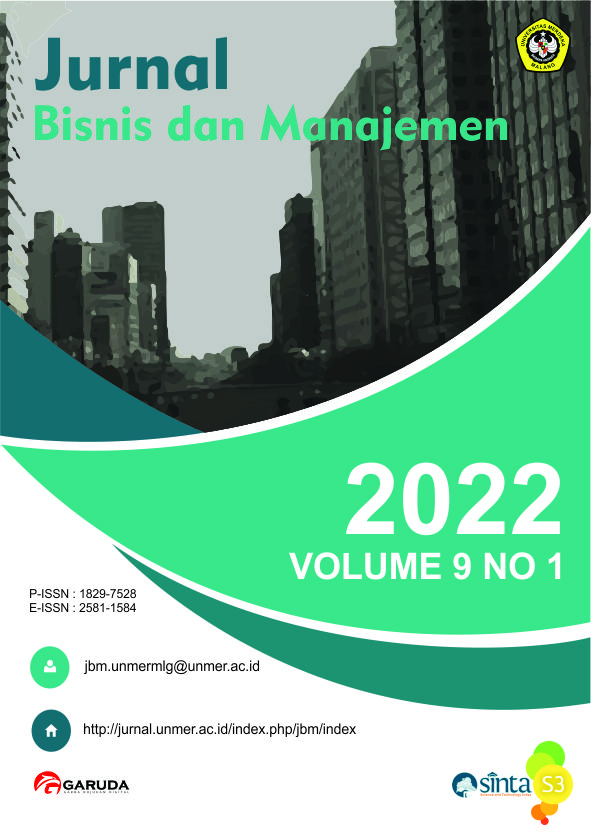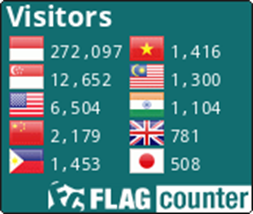Sentimen Investor, Faktor Fundamental Makroekonomi dan Excess Return Pasar Saham di Indonesia
DOI:
https://doi.org/10.26905/jbm.v9i1.7178Keywords:
Sentimen investor, makro ekonomi, excess return, IHSG, GARCHAbstract
This study aims to examine the effect of investor sentimen and macroeconomic fundamentals on excess returns which are useful for decision making in optimizing portfolios. This study used the aggregate market with the aim of knowing the entire stock market in Indonesia, and used daily data during 2020 with a total of 242 data according to the number of trading days in 2020. This study used trading volume, advance-decline ratio, market turnover, share turnover for sentiment investor indicators. SBI Interest Rate, S&P500 Index, and exchange rate were used as indicators of macroeconomic fundamentals. The sentiment investor proxies are analyzed using Principal Component Analysis (PCA). Through GARCH analysis, it is found that investor sentimen has a positive effect on excess return. Based on the Granger Causal test, the study found that excess return granger cause investor sentiment, but not vice versa. Regarding macroeconomic factors, it can be concluded that macroeconomic variables, namely interest rates, the US S&P500 index, and exchange rate have a simultaneous effect on excess return, where the macroeconomic variables explain 22,64% excess return in the Indonesian stock market.
Downloads
References
Assagaf, A., Murwaningsari, E., Gunawan, J., & Mayangsari, S. (2019). The Effect of Macro Economic Variables on Stock Return of Companies That Listed in Stock Exchange: Empirical Evidence from Indonesia. International Journal of Business and Management, 14(8), 108. https://doi.org/10.5539/ijbm.v14n8p108
Baker, M., & Wurgler, J. (2007). Investor sentiment in the stock market. Journal of Economic Perspectives, 21(2), 129–151. https://doi.org/10.1257/jep.21.2.129
Bannigidadmath, D. (2020). Consumer sentiment and Indonesia’s stock returns. Buletin Ekonomi Moneter Dan Perbankan, 23, 1–14. https://doi.org/10.21098/bemp.v23i0.1194
Che, L. (2012). Investor Types and Stock Return Volatility. SSRN Electronic Journal. https://doi.org/10.2139/ssrn.1731594
Chiu, C. wai, Harris, R. D. F., Stoja, E., & Chin, M. (2018). Financial Market Volatility, Macroeconomic Fundamentals and Investor Sentiment. Journal of Banking and Finance, 92. https://doi.org/10.1016/j.jbankfin.2018.05.003
Ernayani, R. (2015). Pengaruh Kurs Dolar, Indeks Dow Jones Dan Tingkat Suku Bunga SBI Terhadap IHSG (Periode Januari 2005 – Januari 2015). JST (Jurnal Sains Terapan), 1(2), 108–115. https://doi.org/10.32487/jst.v1i2.98
Haritha, P. H., & Rishad, A. (2020). An empirical examination of investor sentiment and stock market volatility: evidence from India. Financial Innovation, 6(1). https://doi.org/10.1186/s40854-020-00198-x
Kencana, A. P. P. (2019). Analisis Hubungan Antara Sentimen Investor dan Imbal Hasil Pasar Saham dengan Pendekatan Aliran Dana Reksa Dana dan Analisis Vector Autoregressive (Var). Jurnal Ilmiah Ekonomi Bisnis, 24(3), 204–214. https://doi.org/10.35760/eb.2019.v24i3.2021
Mirayanti, N. M., & Wirama, D. G. (2017). Pengaruh Variabel Ekonomi Makro pada Return Saham LQ45 di Bursa Efek Indonesia. E-Jurnal Akuntansi Universitas Udayana, 21(1), 505–533.
Naik, P. K., & Padhi, P. (2016). Investor sentiment, stock market returns and volatility: Evidence from National Stock Exchange of India. International Journal of Management Practice, 9(3), 213–237. https://doi.org/10.1504/IJMP.2016.077816
Oktavia, S., & Handayani, W. (2018). Effect of Rupiah Exchange Rate, GDP Growth, and Dow Jones Index on Composite Stock Price Index in Indonesia Stock Exchange. Journal of Accounting and Strategic Finance, 1(01), 23–32. https://doi.org/10.33005/jasf.v1i01.24
Putra, D. A. A. (2016). The Effect of Rupiah/US$ Exchange Rate, Inflation and SBI Interest Rate on Composite Stock Price Index (CSPI) in Indonesia Stock Exchange. International Conference on Education, 202–214.
Riantani, S., & Tambunan, M. (2013). Analisis Pengaruh Variabel Makroekonomi dan Indeks Global terhadap Return Saham. Seminar Nasional Teknologi Informasi & Komunikasi, 2013(16), 532–537.
Sumani, S., Sandroto, C. W., & Mula, I. (2017). Perilaku Investor Di Pasar Modal Indonesia. EKUITAS (Jurnal Ekonomi Dan Keuangan), 17(2), 211. https://doi.org/10.24034/j25485024.y2013.v17.i2.2250
Sunaryo. (2013). Analisis Pengaruh Variabel-variabel Ekonomi Makro Terhadap Return Saham. Binus Business Review, 4(1), 541–550. https://doi.org/https://doi.org/10.21512/bbr.v4i1.1418
Wahyudi, R. N., Asdar, M., & Nohong, M. (2018). the Influence of Macroeconomic Variables Toward Jakarta Composite Index on Indonesia Stock Exchange. JBMI (Jurnal Bisnis, Manajemen, Dan Informatika), 14(2), 131–148. https://doi.org/10.26487/jbmi.v14i2.2164
Downloads
Published
How to Cite
Issue
Section
License
Authors who publish with this journal agree to the following terms:
(1) Copyright of the published articles will be transferred to the journal as the publisher of the manuscripts. Therefore, the author confirms that the copyright has been managed by the journal.
(2) Publisher of Jurnal Bisnis dan Manajemen is University of Merdeka Malang.
(3) The copyright follows Creative Commons Attribution–ShareAlike License (CC BY SA): This license allows to Share — copy and redistribute the material in any medium or format, Adapt — remix, transform, and build upon the material, for any purpose, even commercially.














